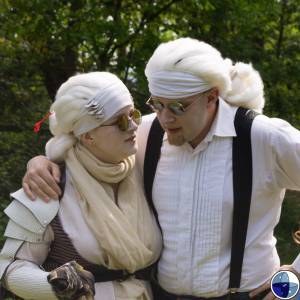User Tools
Sidebar
Table of Contents
Yelk
The Yelk are a race of sentient fungi, occupying the caves of Fornax XII in the Veil Sector. The surface of Fornax XII is periodically bathed in lethal radiation from its star, but life thrives in tunnels carved by rivers into the calcium-rich rock that is abundant on the planet. The Yelk evolved as an extremely cooperative society to exploit resources and protect themselves from predators, and were making the first steps towards interplanetary spaceflight when their radio signals were discovered by the Ascendancy in 3294PT. Due to the First Tulaki Invasion occurring at the time, the majority of contact between Terrans and Yelk was visits by independent traders and scientists, most with separatist leanings. The Yelk were among the initial signatories of the Sovereign Worlds Charter in 3370PT.
Physiologically, Yelk are quite resilient. Their bodies are highly homogeneous, and their flesh dense and spongy. They do not have bones or many of the muscular tissue in other species, and their flexible bodies move via a network of fluid-filled chambers, which can empty and fill in by contracting and expanding. This fluid network doubles as a nutrient circulatory system, and areas can be sealed off in response to injury - the substance is affectionately known as “Yelk Milk” by Free Union physicians. Their fluid-filled and pale flesh leads them to be sensitive to bright light and dry conditions, and they tend to prefer dim, moist environments.
Similarly, Yelk do not possess many “organs” as other species do - their various biological functions are fairly evenly distributed throughout their bodies, generally in small polyps of specialised tissue no larger than a Terran adult thumb. Fluid circulation, nutrient intake and neural function are highly distributed throughout the whole body - most openings in a Yelk body extend only a handful of centimetres before branching off into tiny tubules and spongy fungal tissue. The single exception to this is the mouth/nose analogue, which extends as a single tube into the upper torso, where it terminates in three large chambers that serve as a rumen to break down food, and a gas reservoir for speech and oxygen intake - each chamber is equipped for both functions, and the one used for each changes over time.
Character
Yelk are a highly cooperative species, and tend to enjoy being close to others. They have a tendency towards empathy and being tactile with their friends and allies. They form strong communities and firm friendships in those they trust. It is rare to see a Yelk frowning or angry, as Yelk culture holds that positive emotions engender positive attitudes.
The spores that Yelk release to enhance their communication has resulted in some traits that other species consider odd. As most sophonts cannot detect the spores and their meanings, most Yelk use extremely thorough descriptive language when speaking to non-Yelk. During a conversation they regularly check to see if they have been understood, and this constant questioning has developed into an “accent” of sorts - a rising intonation at the end of each sentence or phrase is extremely common among Yelk who travel the galaxy. Additionally, Yelk names tend to be associated with the primary odour profile of their spores - when translated into speech, this results in Yelk names that describe their “tasting notes”. Examples include ‘Woodsy with a Subtle Musk’, ‘Petrichor with Ginger Notes’, ‘Bold with a Fresh Flavour’ and so on. Like many names, only a shortened version is used.
Appearance
Yelk have the basic form of humanoids, but there the comparison ends. Externally, they are entirely white-fleshed, often described as having “skin like a button mushroom, in colour and texture”, although some exposed parts may have become beige or brown due to UV light exposure triggering a protective melanin coating.
Most Yelk have visual sensory organs that outwardly resemble eyes, but work on a fundamentally different principle. Effectively their “eyes” are openings to inner sensory pits - the pupil is a tube-like gap that can be opened, closed and moved along with the outer surface of the “eye”. The opening and closing of the “iris” modulates the amount of light entering the sensory pits, and the movement of the “eye” allows the Yelk to focus on different things in front of them without having to move their entire head. Yelk “eyes” are in essence finely manipulable areas of outer flesh with a sphincter-like opening to vary the amount of light entering the sensitive sensory pit behind it. The sensory pits are darkened, hemispherical structures with an array of photosensitive cells on their surface. Yelk vision is tuned for the dark environments of the caves where they evolved, and is often overloaded in brighter surface environments. As such, many Yelk cover their sensitive eyes with sunglasses or a thin gauze when in bright conditions. With practice and time, Yelk eyes can acclimatize to brighter conditions, and those who have done so go without protective coverings. Uncommonly, some Yelk do not possess outer eye structures at all, and have their sensory pits on the outside of their face - in these cases, they have fairly smooth skin where their eye-analogues would otherwise be.
Yelk have an array of long, thick hyphae extending down from their “head” structures (this vaguely resembles smooth dreadlocks), rather than anything resembling hair. These structures are studded with spore-like particles which are selectively released when Yelk communicate, and form a significant component of their native language.
Many Yelk also have spore-bearing structures around their face, neck or other parts of their bodies - these usually resemble gills or shelf-mushrooms like Terran oyster mushrooms, in the same colour as their skin. Similar to the hyphae on their heads, these structures release spores that aid in communication and identification.
Game Rules
- Species Keywords: Fungoid
- Default Faction: Free Union
Species Trappings
- As button mushroom-like fungi, Yelk are entirely white-fleshed. Although some exposed parts may have become beige or brown (like a chestnut or shittake mushroom) due to sunlight exposure - they are never pinkish. This look can be achieved with makeup.
- Fungal Eye Pits - Yelk “eyes” are also composed of fungal flesh. This can be achieved, simulated or concealed in one or more of the following ways:
- White irises, which can be achieved with effect contact lenses.
- Covering the eyes with dark sunglasses or a thin gauze (if you cannot wear contact lenses).
- Covering over the eyes with a prosthetic or wrapping that resembles smooth flesh or mushroom growths (with possibly a thicker gauzy covering to still see through).
- Long, thick white hyphae instead of head hair. This look can be achieved with a wig or other hair coverings, or a more sizeable prosthetic resembling Twi'lek Lekku from Star Wars (but with ideally more than two of them).
- (Optional) Spore-bearing structures around the face & neck or elsewhere on the body - resembling oyster mushrooms, in the same colour as the rest of their skin. These structures can be simulated with prosthetics - possible examples can be seen here and here.
Abilities
- 6 Global Body Hits.
- Death Count of 200 seconds.
Yelk do not have internal organs – their specialised tissues are distributed fairly evenly across their entire body. As a result, they do not have locational hits – instead, they have 6 global hits, and become unconscious when this total is brought to 0. Each +1LH they would gain normally instead becomes +3 Global Hits. Armour worn by a Yelk functions as normal (i.e., it is locational). Yelk have a Death Count of 200 seconds. search?q=species%20free_union&btnI=lucky



